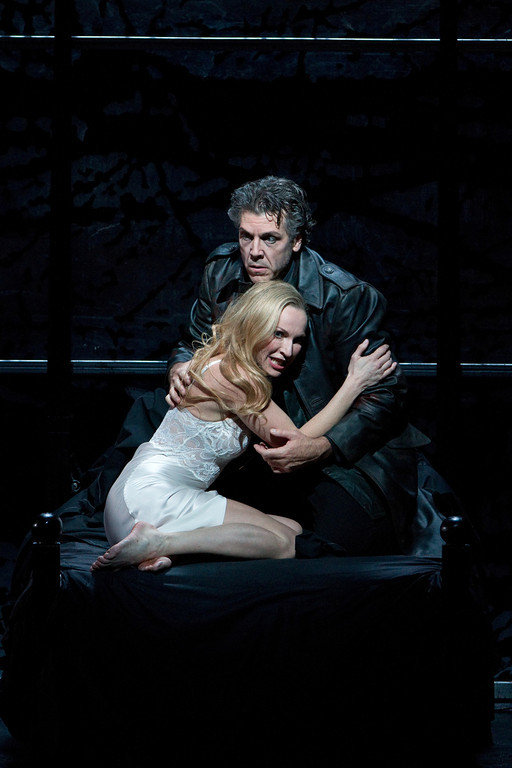Hampson shines darkly in Met’s haunting “Macbeth”

Nadja Michael as Lady Macbeth and Thomas Hampson in the title role of Verdi's "Macbeth." Photo: Marty Sohl/Metropolitan Opera
The coupling of Shakespearean drama and Verdian musical prowess is one that opera fans only wish had happened more often.
With Otello and Falstaff, Verdi fleshed out Shakespeare’s poetry with a seasoned compositional voice representing Verdi’s artistic culmination. Macbeth is the only one of Verdi’s three Shakespeare settings to come from his early period, where his compositional voice still harkens back to his bel canto predecessors.
When composing the piece Verdi was ensured by the Florentine theater for which Macbeth was commissioned, that famed baritone Felice Varesi would be available to sing the title role. Thus, Macbeth was composed for a singer with brilliant acting ability, musicianship and quality of voice.
Thomas Hampson performs the role admirably and with his customary intelligence. His Macbeth is characterized by rugged good-looks, somehow remaining likable for all the carnage wrought by him. His voice is most beautiful in the softer, more legato passages that showcase his excellent musicianship, reminiscent of his early career as a Mozart and lieder singer. One can’t help but wonder if his is the size of voice Verdi had envisioned, as the roundness of tone seemed to flatten in an effort to produce more sound and drama during the climactic passages, particularly in his Act III response to the ghosts of future kings. However, the glorious Act IV aria Pietà, rispetto, amore was particularly well delivered.
Less successful was Nadja Michael as Lady Macbeth. Known for being a devilishly challenging role, Michael was unable to disguise the manifest difficulties. Though very much looking the part of a WW II femme fatale with her toned physique and long blonde hair, her performance was frenetic and affected. Her voice is quite powerful and the tone is lovely, but her top register sounded effortful, which was indicated by odd head-whipping that didn’t not seem in line with the character.
The sleepwalking scene proved to be the most dramatically focused moment for Michael—aided by magnificent staging with some moving chairs and witchy chorus members—but the insanity she portrayed in that moment was rendered less significant by her lack of contrast with the rest of her portrayal. The moment audiences familiar with Verdi’s score wait for is the pianissimo D flat at the end of this scene, which is meant to be sung with, as Verdi described, “fil de voce” (or “thread of voice”). Michael’s attempt was muscled, strident and fleeting.
A vocal highlight of the evening was Dimitri Pittas’s aria as the hero Macduff, which was elegantly and passionately sung, if somewhat reserved. The tenor duet with Richard Cox singing the role of Malcolm, who also sang well, was an interesting and exciting pairing.
Guenter Groissbock’s Banquo was masculine (pulling off a Rambo look in Act I) as well as haunting at the appropriate times, his deep bass full of edge and excitement appropriate to the character. Claudia Waite, Tyler Simpon, Donovan Singletary, Brandon Mayberry were all convincing and musically satisfactory supporting characters.
The chorus of Witches, under the guidance of Donald Palumbo, was ominously and excitingly sung and provided a bit of comic relief with their clever, if sometimes a little off, choreography by Sue Lefton. The male chorus in Act II was particularly notable, precise and together as an ensemble even in its staccatos and pianissimos.
One of the stars of the evening was not on the stage, but rather in the orchestra pit. Gianandrea Noseda conducted flawlessly, with excitement, precision and sensitivity. Early Verdi can fall into the “boom-chuck” category of opera if not handled well, but Noseda certainly found inspiration and nuance in every scene beginning with the riveting overture and throughout the evening.
Adrian Nobel’s production, set in post-WWII Scotland, is haunting and effective. The set and costume design by Mark Thompson enhance the performance without being distracting, with the gorgeous moon before the curtain rises setting the mood of wonder and magic before the first note is played.
Macbeth runs through April 9th. metoperafamily.org.